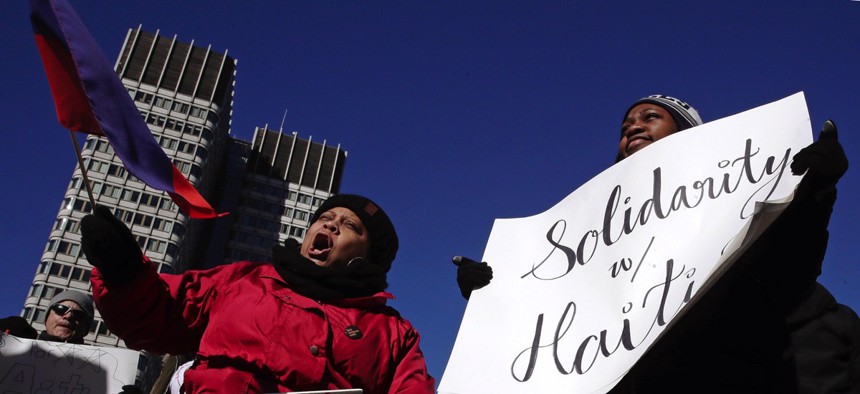Federal Immigration Reform Could Boost Boston’s Economy

Haitian activists and immigrants protest Trump administration delays in re-registering those living in the U.S. legally through the Temporary Protected Status program in Boston on Jan. 26, 2018. Charles Krupa / AP Photo
The city faces a potential labor shortage in key industries it’s typically filled with immigrants.
Balanced federal immigration reform would see Boston’s regional workforce surge during the next decade, while a strict enforcement policy would lead to job losses, according to the city’s Planning & Development Agency.
Neither the Immigration Innovation Act of 2018 nor its predecessor—the Border Security, Economic Opportunity, and Immigration Modernization Act of 2013—were enacted by Congress, but both took a balanced approach. In each case, the number of three-year H-1B visas granted to skilled foreign workers would have risen, the green card process would have been reformed and border security would have been increased.
Strict enforcement would entail deportations and voluntary departures coupled with aggressive border security, BPDA researchers said Wednesday during a webinar analyzing federal immigration policy scenarios’ impacts on Boston. The city currently faces a potential labor shortage in key industries.
“Traditionally, Boston has used migration to fill these labor market demands,” said Phillip Granberry, a BPDA senior research associate.
H-1B and green card workers in Boston generally thrive in the region and represent a $1.2 million higher education value, as well as a $978 million cost savings on K-12 education—which was provided outside the U.S. They comprise 32.8 percent of custom computer programming jobs, 10.3 percent of the computer systems design jobs, 4.6 percent of higher education jobs, and 2.1 percent of engineering jobs.
While Boston’s approximately 20,000 unauthorized immigrants gravitate toward lower-skilled industries, 26 percent have bachelor degrees, according to the Migration Policy Institute. They make up 20 percent of arts, entertainment and hospitality jobs; 18 percent of professional, scientific and management jobs; and 15 percent of educational, health and social services jobs.
Boston’s workforce growth has outpaced its population growth, and 194,264 of those employees are foreign born, according to BPDA. Since 1980, foreign-born workers have been a major driver of the city’s economy.

BPDA extrapolated balanced and strict immigration approaches out 10 years and found the former would lead to average yearly gross city product, or GCP, growth of $1 billion. In 2028, 6,720 jobs would be added to Boston’s economy largely in professional services, state and local government, and health and social services

By contrast, strict enforcement would cause 23,809 jobs to be lost in 2028 with an average annual GCP decrease of $2.3 billion. Those losses would be felt most acutely in industries reliant on unauthorized immigration like hospitality and professional services and construction.

BPDA didn’t estimate how many positions might be replaced by foreign-born workers because a strict enforcement policy has never been implemented, but one would “decrease the number of workers in Boston and limit economic growth,” Granberry said.
Dave Nyczepir is a News Editor at Government Executive’s Route Fifty and is based in Washington, D.C.
NEXT STORY: Vermont Will Pay You $10,000 to Move There and Work Remotely






